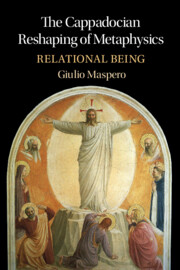Book contents
- The Cappadocian Reshaping of Metaphysics
- The Cappadocian Reshaping of Metaphysics
- Copyright page
- Contents
- 1 Introduction
- 2 Rational Logos
- 3 Relational Logos
- 4 Life from Life
- 5 Philosophical Relation in History
- 6 The Cappadocian Reshaping
- 7 Knowledge and Relation
- 8 Epistemology and Openness
- 9 Conclusions
- Bibliography
- Index
8 - Epistemology and Openness
Published online by Cambridge University Press: 11 January 2024
- The Cappadocian Reshaping of Metaphysics
- The Cappadocian Reshaping of Metaphysics
- Copyright page
- Contents
- 1 Introduction
- 2 Rational Logos
- 3 Relational Logos
- 4 Life from Life
- 5 Philosophical Relation in History
- 6 The Cappadocian Reshaping
- 7 Knowledge and Relation
- 8 Epistemology and Openness
- 9 Conclusions
- Bibliography
- Index
Summary
The final chapter shows how this novelty at the level of theory of knowledge resolves an aporia in Greek metaphysical thought at the epistemological level. Science, in fact, was considered relational by Aristotle, whereas the first principle and thought itself could not be so. The Trinitarian revelation thus allowed the Cappadocians, in their response to Eunomius, to anticipate some of the results of modern logic, in particular Gödel’s incompleteness theorems, by showing that epistemology can only be effective when it is open.
- Type
- Chapter
- Information
- The Cappadocian Reshaping of MetaphysicsRelational Being, pp. 186 - 214Publisher: Cambridge University PressPrint publication year: 2023

